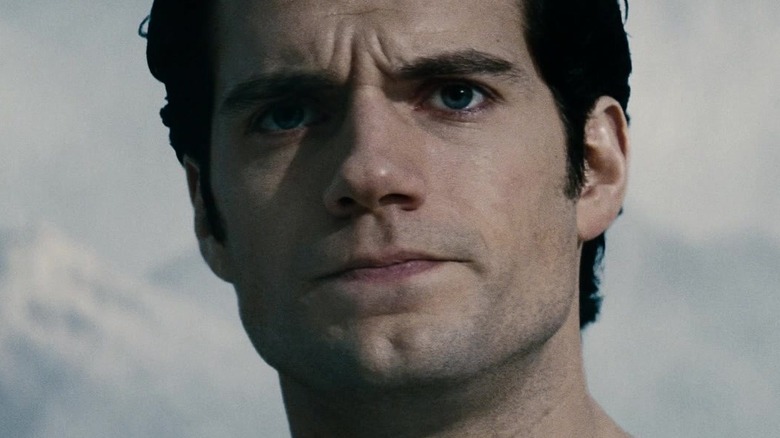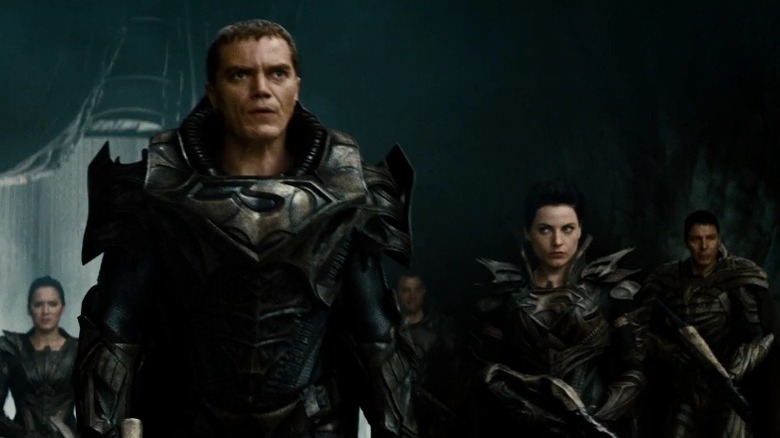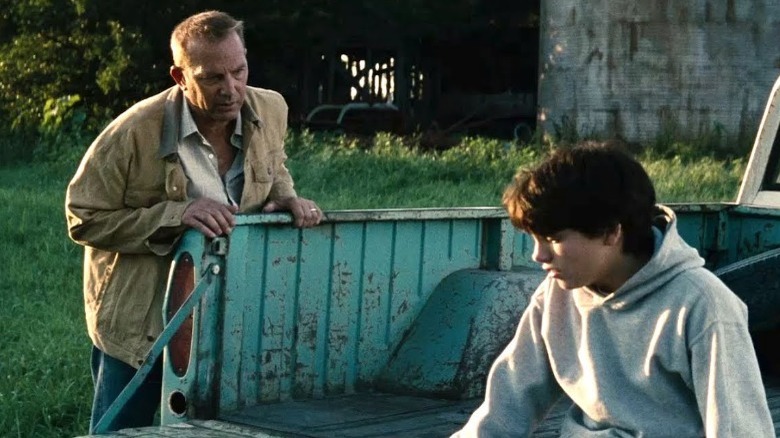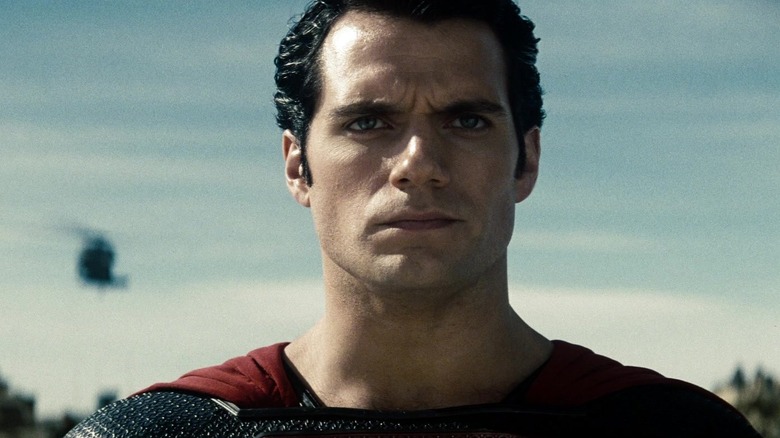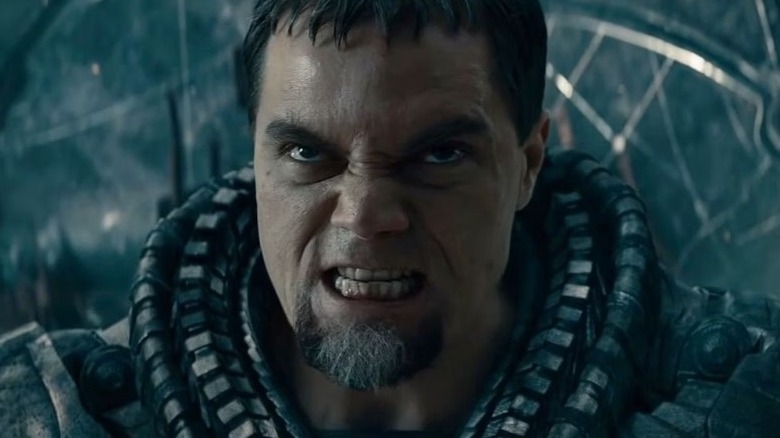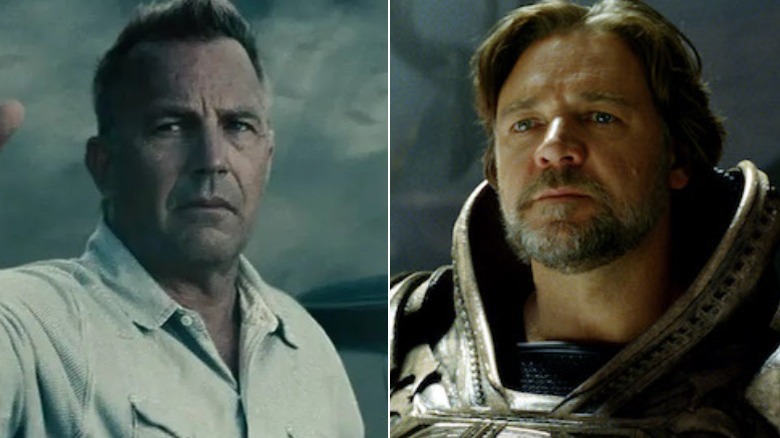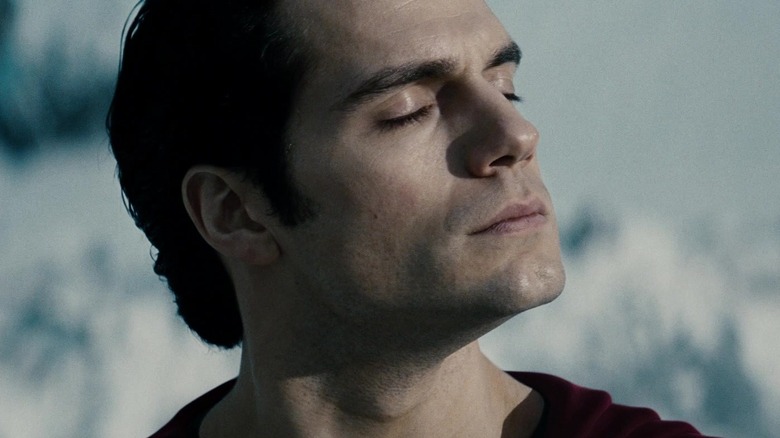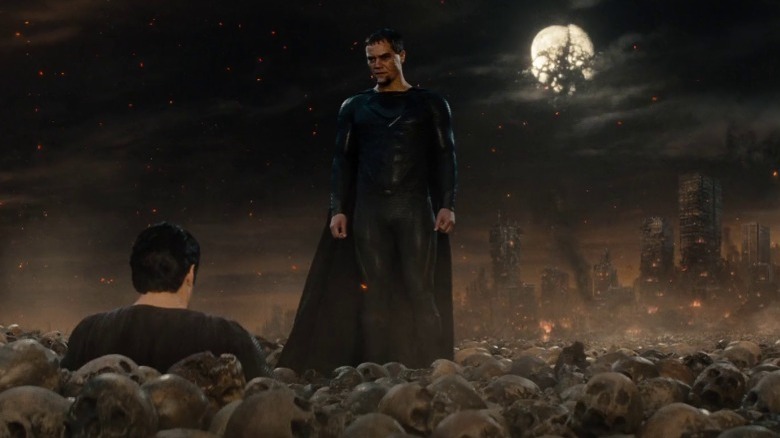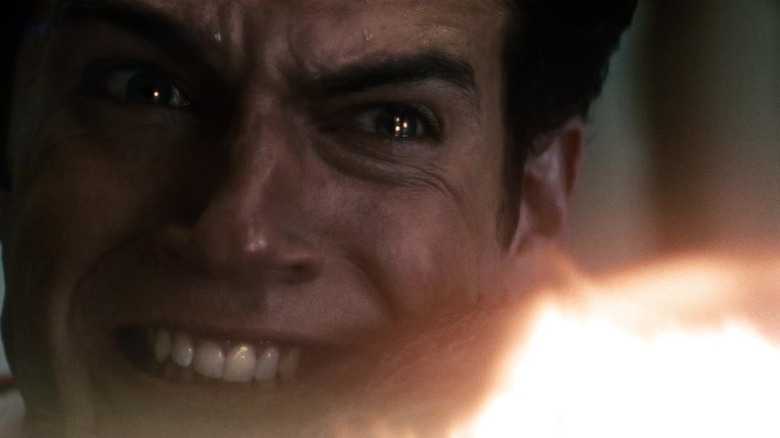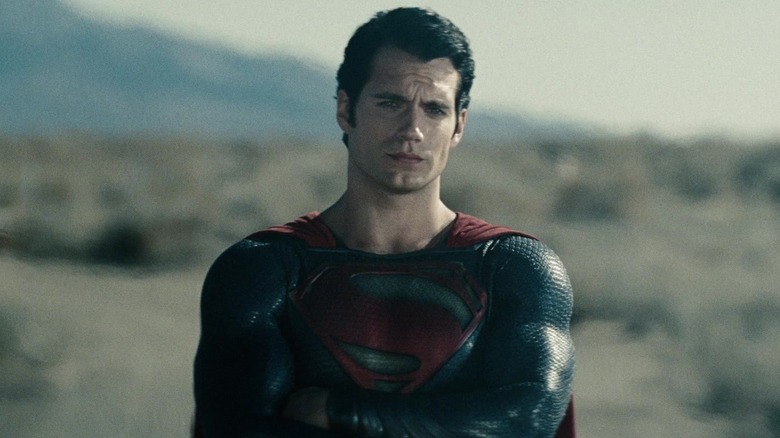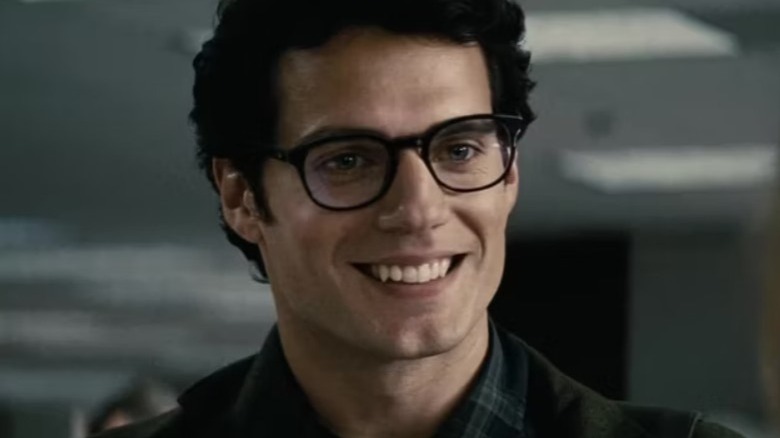The Ending Of Man Of Steel Explained
"There's only one way this ends, Kal. Either you die, or I do." It's a loaded statement from a maniacal, militant zealot from planet Krypton. "Man of Steel" tells the story of Superman (Henry Cavill) like we have never seen before. In the film, General Zod (Michael Shannon) offers a dark mirror image of Superman, one who is hellbent on fulfilling his purpose as a protector of his race at all costs — morality be damned. On the one hand, we have a radicalized extra-terrestrial terrorist. On the other is a refugee fighting for his home. It's not exactly the way you'd expect a Superman story to be framed. But this film endeavors to bring Superman to the real world, not some colorful fantasy from a Golden Age comic book.
When "Man of Steel" was released in 2013, fans were divided over the latest interpretation of the Big Blue Boy Scout. Some longed for the Donner days, when Superman's suit was as bright and sunny as his disposition. Others praised the bold new take on a Superman seen as the alien that he is and portraying a world coping with this truth. "Man of Steel" thrusts the Kryptonian hero into the middle of moral dilemmas so complex, Socrates would be doing somersaults. After all, how does one choose between the preservation of their own race and an entire world filled with the lives of another? There are significant themes to explore in "Man of Steel" and its ultimate conclusion. So let's dive into it, shall we?
Sins of the fathers
While Kal was sent to Earth with a mission to live out his life as he sees fit, the age-old cycle of the past rearing its ugly head threatens to upend that mission. Krypton's government had descended into a hierarchy of madness serving egos and desire for control over listening to science and putting their own people's needs first. As such, the planet becomes doomed after the Kryptonians mine the planet's core for their own gain — a move that feels reflective of mankind's effect on Earth. Kal's father, Jor-El (Russell Crowe) condemns the move and seeks to preserve the Kryptonian race and legacy. General Zod actually has the same goal, albeit with a twist. He stages a coup on Krypton and intends to eliminate the bloodlines that "led them to this awful state."
There's an element of irony that presents itself here, as General Zod is the very product of the destructive society Krypton has become. Jor-El seeks to break the cycle by bearing a son through the first natural birth the planet has seen in centuries. His son, therefore, has no predetermined destiny, unlike the rest of the artificially bred population, who are created to fulfill specific roles on Krypton. In essence, Krypton lost its soul hundreds of years prior to its destruction. While Zod resents the leaders of Krypton for their callous disregard of the planet's stability, his mission of preserving Krypton throughout the film by restarting the process of artificial birth would continue the very society he found abhorrent. Kal recognizes this when he asserts that Krypton "had its chance." Zod's focus is so singular that he can't see the forest for the trees. Superman's very birth, as well as his actions, represents the breaking of Krypton's destructive cycle.
A revelation too big for the world?
"Man of Steel" tackles the idea of humanity reacting to first contact. Despite his humanoid appearance, Clark Kent is an extra-terrestrial hailing from the deepest, darkest corners of space. His adoptive father, Jonathan Kent (Kevin Costner), always understood Clark's nature. He would coach him to keep his capabilities a secret from the world. But Jonathan also knew that one day, the time would arrive when Clark could be in the public eye. While some have seen Pa Kent's attitudes toward Clark's powers as a dereliction of his duty to bolster the Man of Steel as seen in past iterations, there's a different side being presented here.
Of course, Jonathan is acting as a concerned parent. But he also understands that the time will come when Clark is a full-grown adult who will have a level-headed perception of the world and be able to properly weigh the consequences of his choices. Jonathan may have felt cold at times suggesting that Clark, perhaps, shouldn't have saved a school bus full of his peers. But he walked the walk when sacrificing himself to keep Clark's secret. As far as moral philosophy is concerned, Jonathan was indeed the epitome of a utilitarian — one who pivots toward the greater good. Jonathan knows that one day, Clark will be a hero who will be able to save countless lives. That outweighed his own life. Additionally, Jonathan understands that the world will be trepidatious in its acceptance of Clark. That's an easy truth to grasp considering the world's problems with racism, bigotry, and xenophobia. Simply waiting, then, became the obvious choice.
The cost of freedom
Imagine having your identity stripped away at birth. Kryptonians faced that reality for centuries. As babies, in the faux-womb of the genesis chamber, a predetermined purpose was written into their genetic code. By design, the government has total control over its population. Jor-El dreamed of something different for his son. Jor-El longed for a child who could forge his own path in society and not be beholden to the whims of a tyrannical regime.
From an ideological perspective, Zod and Superman represent two sides of a coin. Whether Zod understands this or not, he isn't free. He can't shake his own ambition to renew his people and culture. That level of control comes at a hefty cost, one that Zod is more than willing to pay. The narrative establishes his loyalty to Krypton as something that resulted not by choice, but rather a genetic compulsion. His goals for Krypton are like an itch he simply can't scratch until he succeeds. Zod's loss of agency begets the loss of freedom for others, namely the people of Earth. In his quest, the annihilation of humanity would be in order — if it weren't for Superman, of course. Superman, on the other hand, shows us that freedom allows us to make difficult choices. It then becomes a matter of heart over mind. But there will always be an enemy to freedom, which ultimately places a high cost on its pursuit.
Nature versus nurture
There's also something to be said about the conflict between Zod and Superman being one of nature versus nurture. This has actually been an element of Superman's story long before "Man of Steel." Baby Kal-El's crash landing in the Kent farmlands was serendipitous. After all, the spaceship could've landed just about anywhere. But Jonathan and Martha Kent were the perfect couple for the job. For starters, they didn't turn the alien child over to authorities. They instilled their own standards and moral code in young Clark all throughout his upbringing. It's that principled center that makes Superman who he is. Other stories depict alternate realities where Kal-El crash lands in other places, to see how a different upbringing changes him — in "Superman: Red Son," he is brought up in the Soviet Union. The results are drastically different.
Jor-El may have been an anomaly, a Kryptonian who was simply smart and wise enough to learn from his mistakes. However, Zod was one of many among the Kryptonian population who was born and bred from a "test tube" chamber. Parental factors were minimal, and his only guiding principles were tied to the purpose he was born to fulfill.
Two fathers
Much of "Man of Steel" is defined by fatherhood. Both Jor-El and Jonathan Kent play an integral role in Superman's choices in the film's finale. Characteristically, no matter how much one is tied to a specific lineage, fatherhood isn't defined by blood. In fact, the idea that one's genetics and family history predetermine an individual's path is shattered by Superman's eventual mission.
Regardless, both fathers actually work in tandem to set their son up for a future as a hero among humanity. Jonathan protects Clark and hides his secret from the world until the day comes that both Clark and the world can cope with his existence among humankind. But more importantly, Jonathan doesn't sugarcoat the eventual decision that Clark is going to have to make. "You have to decide what kind of man you want to grow up to be, Clark; because whoever that man is, good character or bad, he's ... he's gonna change the world." It's a reality Jonathan relentlessly reminded his son of. His power and grandeur would only magnify the person he decides to become. However, when Clark talks to Jor-El (well, his AI consciousness) aboard Zod's ship, Jor-El finally guides him toward the path Jonathan had prepared him for his entire life. "You can save her, Kal. You can save all of them," Jor-El proclaims as Clark watches Lois Lane's (Amy Adams) escape pod plummet to Earth. It's the teachings of both fathers that make Superman who is.
Hope and faith
The core of "Man of Steel's" narrative is rooted in hope and faith. Everything begins with Jor-El's hope that his son, Kal, will build a better world than the one he's leaving behind. Both of Kal's parents exercise faith by sending their son on a trek through space with the hope that he's not lost out in the cold recesses of the universe. Jor-El puts the entire genetic history of Krypton at stake with the gamble he takes on his son both arriving on Earth soundly and growing to be a man of virtue.
Of course, we can't omit discussing Clark's encounter with Father Leone (Coburn Goss). After Zod beckons Clark to emerge for the good of Earth, he questions whether Zod can be trusted. Conversely, he questions whether the human race can also be trusted to not lead a path of total destruction like Clark's forebearers. "Sometimes, you have to take a leap of faith first. The trust part comes later," Father Leone counsels.
Zod shows us exactly what happens when hope is extinguished. For the majority of the film, Zod envisions a new dawn for Krypton. He's willing to make it happen no matter how dicey or amoral things have to get on Earth. Once Superman destroys the genesis chamber, Zod's hope evaporates. He then focuses on his rage which is an endless force for destruction until stopped.
Radicalism and genocide
In General Zod's view, he is a savior and protector of his people. His code is to embody those two things. As he clearly states to Superman in the ending of the film, he exists "only to protect Krypton." Zod remarks, "That is the sole purpose for which I was born. And every action I take, no matter how violent or how cruel, is for the greater good of my people." So under a different lens, Zod is a crusader for his people and a hero. Most militant radicals believe that they're on the right side of history. It's also difficult to ever convince them of their wrongdoing when their idea of right and wrong just doesn't match the rest of society's. Thankfully, most would vibe with the belief that genocide, extra-terrestrial or not, is morally wrong. But again, Zod's rules only support the narrow Kryptonian perspective.
Radicalism is often a product of the absence of freedom. Krypton clearly formed a tyrannical regime outlawing something as natural as conception and birth. Tight laws around population control doubled as a means of controlling those born into Krypton society. Being genetically coded with a predisposition ultimately removes open minds and free thinkers from the equation. Such control breeds radicals who cling to an ideology fiercely. This gives them purpose and a reason for existing. Krypton's government created a madman like Zod. Even after the death of the planet, the alien world's soulless regime still echoes across the universe thanks to Zod's survival.
A righteous kill
This is the big one. It's the moment that caused many Superman fans to unravel in their seats. Superman kills General Zod. It's truly difficult to discuss the merits of Superman and his resistance toward inflicting death upon his enemies. We don't live in a comic book world where everything can be tied up neatly with a bow. And "Man of Steel" endeavors to present Superman as if he were in our world — not some comic book fantasy.
The closest comparison to this moment could be Superman's clash with Doomsday in "The Death of Superman." In the comic book storyline, the seemingly indestructible monster is relentlessly killing. The only way he'd stop is if Superman killed him — which he did. Of course, Superman was ostensibly killed in the battle, also. This was later adapted to live action in the sequel film "Batman v Superman: Dawn of Justice." However, the concept is the same. Zod is an all-powerful being willing to kill every last human he can find in a fit of rage. He literally tells Kal he'll never stop as he assaults a human family with his heat vision. The choice is undeniable — let Zod live and see the world destroyed or kill Zod. There's no magic prison, and the possibility of going back into the phantom zone is gone. The filmmakers put Superman in an impossible situation — a rather bold and brilliant move. Like Jonathan before, Superman takes the road of the utilitarian. Many lives are spared at the cost of one.
Control in perpetuity
There's a sense of safety and comfort that comes with control. Conversely, when we feel out of control, that stirs anxiety and tension within us. While it might be natural, "Man of Steel" is a cautionary tale showing us that there must be a line in the sand somewhere. Krypton took control of its people and the planet. Having done so, Kryptonians bred a population of corrupt politicians, militant zealots, and careless scientists while damning their world to destruction. Have you ever noticed the destroyed moon floating in the sky of the Kryptonian landscape? That was an Easter egg that references a point in comic book history where an irresponsible scientist launched an experimental rocket at the lunar satellite's surface. Clearly, that was a sign for where Kryptonian society was headed. Ultimate control is tyrannical and it will backfire — always.
The hope is that Superman can help humanity achieve a different future. "You will give the people of Earth an ideal to strive towards. They will race behind you, they will stumble, they will fall. But in time, they will join you in the sun, Kal. In time, you will help them accomplish wonders," Jor-El states to his adult son. Superman doesn't only have to be the hero who swoops in to save the day. Because he's untouchable, he can set an example for humankind. Though the American government still fears Superman at the end of the film and uses a spy plane to find Superman's home base, Superman forces them to accept their fears and have a little faith in him.
A beacon of light
Since the release of "Man of Steel," many have wondered why director Zack Snyder and company chose to take a more grim and dour tone with their take on Superman. Part of that comes with the real-world territory. Whether we believe it or not, the world isn't always a sunny place — metaphorically speaking. The film deals with Clark wrestling with his own humanity. He's not yet Superman in this film — at least not the one we know and love. Zod sent him crashing through buildings, and detractors might be wondering how he can be so careless. But it might be easily forgotten that he just learned how to fly mere days ago. He's probably never thrown a legitimate punch in his entire life, let alone saving a woman from a crashing space pod.
Physical attributes aside, Superman also must embrace his Kryptonian legacy alongside his human nature. It's a complicated feat that no one on Earth can relate to. However, his inner turmoil over the desire to aid his fellow Kryptonians but defend humanity is a character-building experience. The greatest attribute of Superman is his compassion. He doesn't retaliate out of anger. This is evidenced by his restraint as a child when being bullied. But the ending of the film ushers in a Superman close to the one we know from the colorful pages of comic books. He understands his responsibilities. Even better, he's grasped the man he wants to be after being forced to make difficult decisions. The Man of Steel can now be a true beacon of light for the world.
